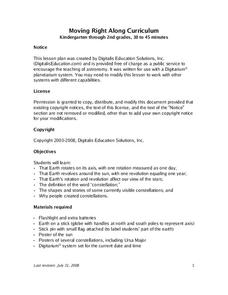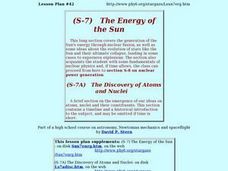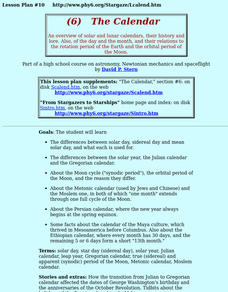Curated OER
#22 Frames of Reference: The Basics
Students explore the concept of frames of reference in physics.
Curated OER
Frames of Reference: The Basics
Learners learn the concept of frames of reference in physics. They examine how two frames of reference, each moving with respect to the other with a constant velocity v (constant speed, constant direction).
Curated OER
Using Parallax to Determine Distances
Students study parallax and what it is used for. In this distance lesson students complete an activity that allows students to get experience using a parallax.
Curated OER
Stellar Lunar Curriculum
Students engage in a instructional activity about the moon and three different constellations. They conduct research using a variety of resources. The teacher leads the class with demonstrations and discussion groups. The research is...
Curated OER
Sweet Candy Comets
Fourth graders use candy to make a comet. In this lesson, 4th graders examine the role comets have played throughout history, students watch NASA videos about comets and complete the lesson by making an edible model of a comet. This...
Curated OER
FRAMES OF REFERENCE: THE BASICS
Students examine the concept of frames of reference in physics: that two frames of reference, each moving with respect to the other with a constant velocity v, observe the same accelerations and therefore Newton's laws are the same in both.
Curated OER
Meteor Showers
Students use the Internet to discover the wonderful world of comets and meteor showers. They discover how to spot one and predict them using a calendar. They also examine the makeup of meteoroids and meteorites.
Curated OER
It's Just a Phase
Young scholars describe the phases of the moon and play a game with moon phase cards.
Curated OER
Earth's Rotation
Students explore the Earth and its rotation. Volunteers model the sun-Earth system to demonstrate that the Earth rotates around the sun. In groups, students simulate "traveling" around the sun and discuss when it is night and day.
Curated OER
Seeing Interference Fringes with a Telescope
Students construct an interferometer using a simple telescope. In this physics instructional activity, students explain how light waves create the fringe patterns. They observe patterns made by different objects in the sky and compare them.
Curated OER
Stellar Lunar Curriculum
Students engage in a lesson that covers the concept of different phases of the moon. They name the cycles of the phases of the moon while using flashlights to simulate the light of the sun. They research information about several...
Curated OER
Working on the Moon
Students take a mission to the moon. In this space science lesson, students visit selected websites to discover information about Earth's moon and the solar system. Students may take virtual missions to the moon and share information...
Curated OER
The Energy of the Sun
Students study energy generation by the Sun, which involves atoms and nuclei.
Curated OER
Journey To The Solar System
Third graders engage in a lesson to find different facts and connect them to the concept of the solar system. They conduct research using the technology integration of the internet. Using the information the students create a classroom...
Curated OER
The Calendar
Students engage in an overview of solar and lunar calendars, their history and lore. Also, of the day and the month, and their relations to the rotation period of the Earth and the orbital period of the Moon.
Curated OER
Comparing the Satellite and Broadcast Radio Landscapes
High schoolers research the development of satellite technology over the last 50 years students explain how the enactment of the Telecommunications Act of 1996 changed the rules for corporate ownership of multiple media outlets.
Curated OER
Heat Currents
Students using a slide made out of aluminum foil and pin holes observe visible light.
Curated OER
BOUNCING INFORMATION AROUND
Learners examine how satellite signals are sent and duplicate it with a mirror, flashlight and black paper.
Curated OER
The Vocabulary of Space
Students build their knowledge and understanding of vocabulary related to space. In this space lesson, students discuss four categories of words and phrases related to space.
Curated OER
Is It Lunar or Lunacy?
Sixth graders are introduced to the moon and its phases. Individually, they draw a sketch of each phase of the moon and read a short article about Galileo. To end the lesson, they examine the difference between refracting and...
Curated OER
Powers of 10
Students explore universe, and examine how big it really is and how scientists measure the distances or sizes of things by estimating sizes of different objects and reading and writing numbers in scientific notations.
Curated OER
The Path of the Sun, the Ecliptic
High schoolers are introduced to the ecliptic, the zodiac and the apparent motions of the Sun, Moon and planets across the sky.
Curated OER
The Path of the Sun: The Ecliptic
Pupils investigate the celestial sphere and the paths it takes in the solar system.
Curated OER
Pinhole Viewer
Young scholars make a pinhole viewer to demonstrate how it inverts light passing through it which produces inverted images.

























